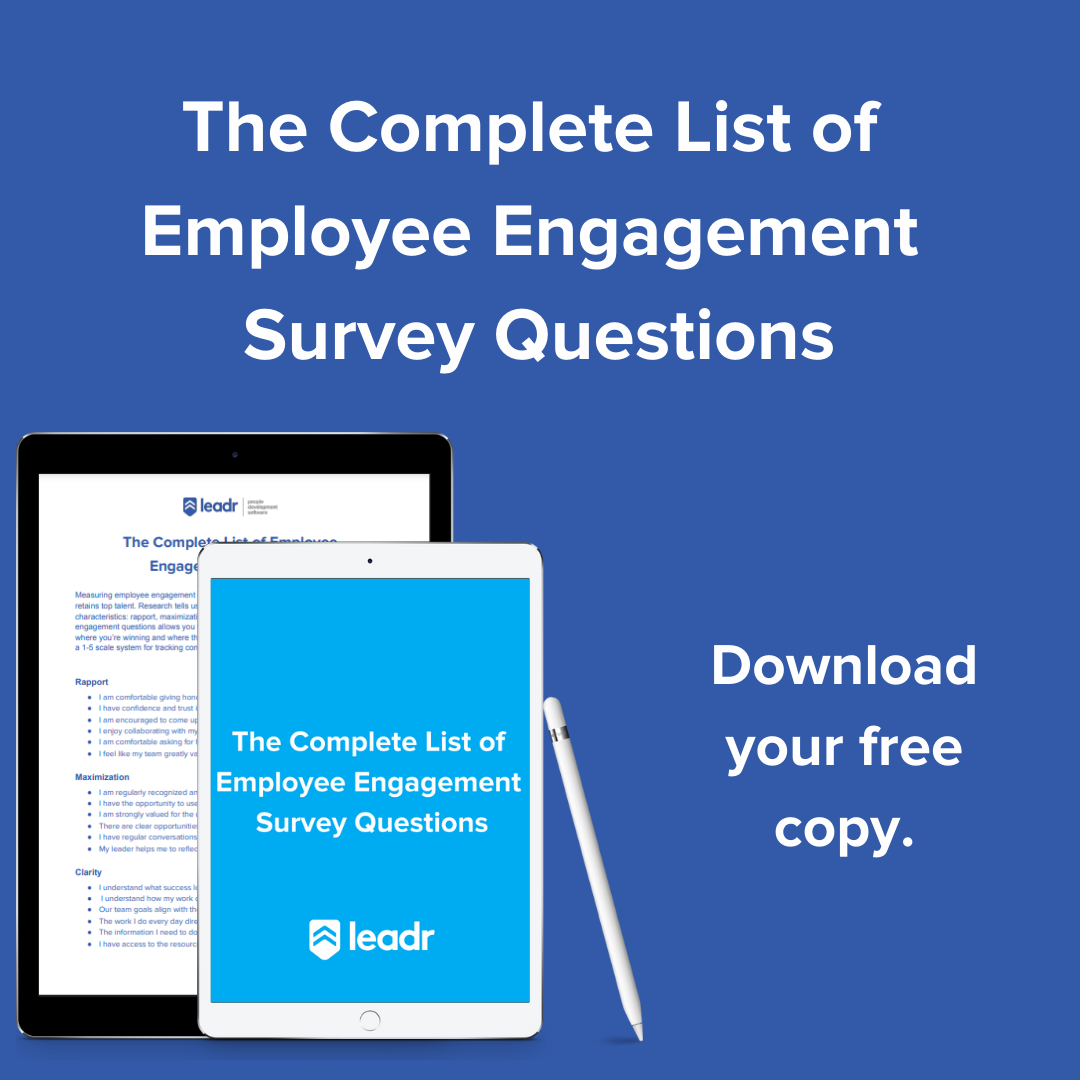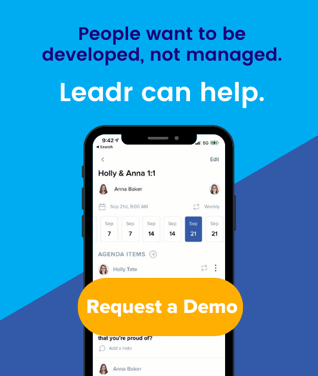Your Guide to Conducting Effective Exit Interviews: Questions, Best Practices, and Next Steps
One thing is true of all people in your organization: they will move on to different opportunities at some point. Whether it’s for retirement or a dream job, transitions happen every day and employee turnover is inevitable.
Gallup tells us that disengaged employees cost the organization 30% of their paycheck. In the case of a disengaged employee, it can be beneficial to part ways before disengagement takes a toll on their wellbeing, your culture, and your bottom line.
No matter the circumstances, the way you say goodbye to people, what you learn from the exit interview process, and how you apply those learnings will ensure that your organization is continuously growing through change.
What is an Exit Interview?
An exit interview, or exit survey, is a series of questions you ask employees who are in the process of leaving your company. Employees interviewed during an exit survey are more likely to be brutally honest. Their departure means that they can speak freely without fear of repercussions.
As a leader, this allows you to gain insight that can help you improve staff retention, culture and performance, and alerts you to any problems that need to be immediately addressed. By asking the right questions you can glean valuable information about how your organizational culture can improve and make sure employees leave on a positive note.
In the best case, employees who transition out of your organization can be your biggest advocate for potential future hires. The most powerful sign of a good organizational culture is having employees that would recommend having their friends work there even after they’ve moved on.
Exit Interview Best Practices
Exit interview policies and practices vary widely from organization to organization, on everything from timing to format to the person responsible.
Timing
Exit interviews are meant to provide useful information. Holding an interview shortly after an employee announces their intention to depart will likely yield information tinged by heightened emotions. Waiting until the days before an employee leaves means that that individual has thoroughly disengaged and may not provide much substance.
Many companies find that holding the exit interview mid-way between these two points is the most productive opportunity to gain information. The timing may change depending on the circumstance.
Format
There are two main methods for holding exit interviews: as one-on-one discussions or as a survey.
One-on-one discussions are the most common format for an exit interview. This gives the interviewer the opportunity to ask follow-up questions that can clarify how a departing employee feels and leave the relationship as positive as possible. When holding exit interviews in a one-on-one format, be sure to send out a preliminary list of questions in advance. This gives the departing employee time to think through more intentional answers. A full interview also shows a level of care for the person who is leaving your organization. Allowing them the opportunity to share their experience and maintain a personal connection as they move on shows the employee that you value their thoughts and are invested in growth based on their experience.
Exit surveys, on the other hand, allow organizations to gather standardized data. Answers can be sorted by various demographics to identify trends. Although this method allows for greater flexibility in scheduling and timing, it can also come across as impersonal and unimportant.
If you’re able, try using both a survey, which will give you concrete data, and a one-on-one interview, which allows you to dive deeper into the learnings and takeaways offered by the departing employee.
Interviewing Parties
The most effective exit interviews are held by someone in the organization who is at least one step removed from the departing employee. When you institute a level of separation, it helps to elicit more honest and constructive feedback during the interview. It is important that the person conducting the interview is not so far removed that they are unable to follow up or take action when useful feedback is provided.
Typically, an HR team member will handle exit interviews. In organizations that don’t have an HR department, this responsibility might fall on an Operations Manager, Office Manager, or a manager from a different department than the departing employee.
It’s also beneficial for the manager to have an exit interview with their employee before they leave, however this interview would be more focused on the department and manager/employee relationship versus the company culture as a whole.
The Complete List of Exit Interview Questions
The questions you ask during an exit interview should elicit honesty from your employee. Poorly chosen questions can get in the way of a productive conversation.
Here is a complete list of the best questions that you can choose from to conduct an exit interview. Remember to make it personal and applicable by selecting the most appropriate questions from this list.
General Exit Interview Questions
These questions are a great place to start when you are conducting exit interviews. The responses you receive to these general questions may lead you to ask more specific follow-up questions.
- Tell me about your decision to leave.
- Would you recommend our organization as a place to work?
- Do you feel that our organization reflects your values?
- How would you describe your relationship with your manager?
- Do you feel your growth and development were invested in here?
- Did you experience role clarity while working here?
- Were you well-equipped to do your job here?
- Did you feel included and accepted for who you are?
- What did you enjoy most about your time working here?
- What was your least favorite part about working here?
- What could we have done to keep you on board?
- How could leadership improve?
- What should we start, stop, and keep doing?
- What skills or qualities should we look for in your replacement?
- What advice would you offer to a future hire?
- Are there any final issues or concerns you’d like to address?
The questions in the following sections make great follow-up questions if you want to dive deeper into a particular issue or answer.
Exit Interview Questions for When You Know Why They Are Leaving
Sometimes you’re lucky enough to know the reason a team member is leaving. Whether they’ve shared that they’re leaving due to an issue or for a new, dream opportunity, here are some specific questions you can ask:
If leaving due to disengagement or termination
It's still best to offer an exit interview to employees who are fired. Before you get to this point, it's best to place that employee on a Performance Improvement Plan, or PiP. We have a guide for how to do that here.
If the PiP doesn't help and the employee is terminated, or if they leave due to disengagement, these questions can help you better understand how to hire their replacement and improve moving forward:
- What would have helped you feel more engaged?
- Were you recognized for your contributions or achievements here?
- Do you feel that your voice was heard here?
- Did you have the opportunity to offer feedback while working here?
- Did you have regular 1:1 meetings with your manager where you were cared for, developed, and given feedback?
- Do you feel aligned to our organizations mission and values?
- If you’re leaving because of an issue you have with our organization, did you express your concerns to anyone? If so, how did they handle it?
If leaving for a new opportunity
- What does your new job offer that we didn’t?
- Would you ever consider returning to work with us?
- What will you miss about working here?
- Do you think your job description changed while you worked here, and did it influence your decision to leave?
- Were there enough opportunities for growth here?
- What did you learn here that you’ll take into your new role?
Exit Interview Questions About Managers
Up to 70% of an employee's experience in an organization is influenced by their interactions with managers. When that experience goes well, people are less likely to quit their jobs. But when that relationship sours, it causes employees to leave.
- Were you comfortable talking to your manager?
- How would you describe your manager’s management style?
- What challenges were present when working with your manager?
- How did you feel about the feedback that you received from your manager?
- How could your manager have helped you more on the job?
- How much did your manager’s actions match their words?
Exit Interview Questions About Diversity & Inclusion
83% of Generation Z candidates said that a company’s commitment to diversity and inclusion is important when choosing an employer. If these employees find that your organization is lacking in these areas, it can be a reason that they leave.
- How fairly or unfairly do you think this organization treats all of its employees?
- Do you think our culture has diversity but lacks inclusion?
- Are all employees addressed in a respectful way?
- Did you ever see examples of exclusion within the organization
- What changes in the hiring process would you like to see in terms of diversity and inclusion?
- What tips would you give us to prioritize diversity and inclusion in our organization?
Exit Interview Questions About Culture
The Millennial workforce ranks culture at the top of the list when evaluating jobs. If your organization does not promote a positive culture, this portion of the workforce will not hesitate to look elsewhere for a better fit.
- How would you describe the culture in our organization?
- What are the strengths of our current company culture?
- What are the shortcomings?
- Who would you speak to about your concerns?
- Do you feel that there is unhealthy competition among peers in the organization?
- What was your worst day on the job like?
- What was your best day on the job like?
Exit Interview Questions About Work-Life Balance
Being able to balance work and life responsibilities is a priority for the growing number of young people in the workforce. 42% of current remote workers value the flexibility that their position provides and would look for work elsewhere if that balance is no longer feasible. Here are some questions you can ask to determine if the work-life balance at your organization needs some adjustment:
- Was it hard to manage your personal and professional life?
- Did you have to stay late often or take your work home?
- Which form of working arrangement made you the most satisfied and productive?
- Did the work or environment make you feel burnt out?
- Did you miss important personal experiences because of work?
- Were you able to take regular breaks to refresh yourself during a typical workday?
- What advice do you have for us to help our employees achieve a better work-life balance?
The Exit Interview is Over - What Now?
Exit interviews are more than just an opportunity for the leaving employee to share their experience. The information that you collect during this process can provide you with valuable insight into the workings of your organization. But that information does you no good unless you act on it. When you notice patterns or large issues, create a plan to address the problems and prevent more of your valued employees from leaving.
It’s good to share big learnings from each exit interview with your leadership team after an exit interview to maintain alignment and transparency on where improvement is needed.
While you can’t keep every employee from leaving, spending time developing the people in your organization can help increase engagement and prevent turnover. What difference would it make if you knew that every person on your team was engaged and growing in their role? Click here to learn more about how Leadr’s people development software can help you build better, more effective teams.
Share this
You May Also Like
These Related Stories

Beyond Trendy Perks: What Employees Really Want for a Rewarding Workplace Experience

4 Tools To Tackle Poor Performance








No Comments Yet
Let us know what you think